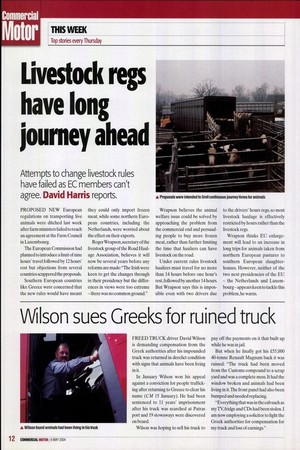Livestock regs have long journey ahead
Page 12

If you've noticed an error in this article please click here to report it so we can fix it.
Attempts to change livestock rules have failed as EC members can't agree. David Harris reports.
PROPOSED NEW European regulations on transporting live animals were ditched last week after farm ministers failed to reach an agreement at the Farm Council in Luxembourg.
The European Commission had planned to introduce a limit of nine hours' travel followed by 12 hours' rest but objections from several countries scuppered the proposals. Southern European countries like Greece were concerned that the new rules would have meant
they could only import frozen meat, while some northern European countries, including the Netherlands, were worried about the effect on their exports.
Roger Wrapson, secretary of the livestock group of the Road Haulage Association, believes it will now be several years before any reforms are made: "The Irish were keen to get the changes through in their presidency but the differences in views were too extreme — there was no common ground."
Wrapson believes the animal welfare issue could be solved by approaching the problem from the commercial end and persuading people to buy more frozen meat, rather than further limiting the time that hauliers can have livestock on the road. Under current rules livestock hauliers must travel for no more than 14 hours before one hour's rest, followed by another 14 hours. But Wrapson says this is impossible even with two drivers due
to the drivers' hours regs, so most livestock haulage is effectively restricted by hours rather than the livestock regs.
Wrapson thinks EU enlargement will lead to an increase in long trips for animals taken from northern European pastures to southern European slaughterhouses. However, neither of the two next presidencies of the EU — the Netherlands and Luxembourg— appears keen to tackle this problem, he warns.


























































































































































































